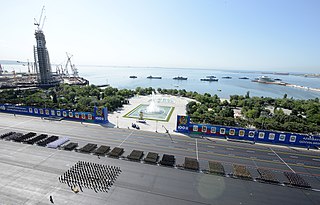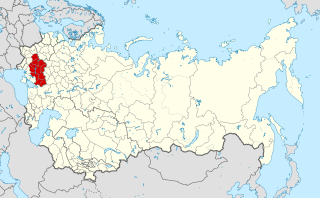
Reichswehr was the official name of the German armed forces during the Weimar Republic and the first years of the Third Reich. After Germany was defeated in World War I, the Imperial German Army was dissolved in order to be reshaped into a peacetime army. From it a provisional Reichswehr was formed in March 1919. Under the terms of the Treaty of Versailles, the rebuilt German Army was subject to severe limitations in size, structure and armament. The official formation of the Reichswehr took place on 1 January 1921 after the limitations had been met. The German armed forces kept the name Reichswehr until Adolf Hitler's 1935 proclamation of the "restoration of military sovereignty", at which point it became part of the new Wehrmacht.

A commander-in-chief or supreme commander is the person who exercises supreme command and control over an armed force or a military branch. As a technical term, it refers to military competencies that reside in a country's executive leadership, a head of state, head of government, or other designated government official.

The Bundeswehr is the armed forces of the Federal Republic of Germany. The Bundeswehr is divided into a military part and a civil part, the military part consisting of the German Army, the German Navy, the German Air Force, the Joint Support Service, the Joint Medical Service, and the Cyber and Information Domain Service.

A gendarmerie is a military force with law enforcement duties among the civilian population. The term gendarme is derived from the medieval French expression gens d'armes, which translates to "men-at-arms", or "rural police". In France and some Francophone nations, the gendarmerie is a branch of the armed forces that is responsible for internal security in parts of the territory, with additional duties as military police for the armed forces. It was introduced to several other Western European countries during the Napoleonic conquests. In the mid-twentieth century, a number of former French mandates and colonial possessions adopted a gendarmerie after independence. A similar concept exists in Eastern Europe in the form of Internal Troops, which are present in many countries of the former Soviet Union and its former allied countries.

The German Army is the land component of the armed forces of Germany. The present-day German Army was founded in 1955 as part of the newly formed West German Bundeswehr together with the Marine and the Luftwaffe. As of January 2022, the German Army had a strength of 62,766 soldiers.

Many nations around the world observe some kind of Armed Forces Day to honor their military forces. This day is not to be confused with Veterans Day or Memorial Day.
Landwehr, or Landeswehr, is a German language term used in referring to certain national armies, or militias found in nineteenth- and early twentieth-century Europe. In different context it refers to large-scale, low-strength fortifications. In German, the word means "defence of the country"; but the term as applied to an insurrectional militia is very ancient, and lantveri are mentioned in Baluzii Capitularia, as quoted in Henry Hallam's Middle Ages, i. 262, 10th edition.

The Reich Labour Service was a major labour organization established in Nazi Germany as an agency to help mitigate the effects of unemployment on the German economy, militarise the workforce and indoctrinate it with Nazi ideology. It was the official state labour service, divided into separate sections for men and women.

The Federal Ministry of Defence, abbreviated BMVg, is a top-level federal agency, headed by the Federal Minister of Defence as a member of the Cabinet of Germany. The ministry is headquartered at the Hardthöhe district in Bonn and has a second office in the Bendlerblock building in Berlin, which is occasionally used colloquially to denote the entire Ministry.

Podpolkovnik is a military rank in Slavic and nearby countries which corresponds to the lieutenant colonel in the English-speaking states and military.

Sergey Leonidovich Sokolov was a Soviet military commander, Hero of the Soviet Union, and served as Minister of Defence of the Soviet Union from 22 December 1984 until 29 May 1987.

The Ministry of National Defence is a office of government in Poland headed by the Minister of National Defence. It is responsible for the organisation and management of the Polish Armed Forces. During the Second Polish Republic and World War II it was called the Ministry of Military Affairs. Ministry budget for 2022 was 140 billion PLN.

The Kiev Military District was a military district of the Imperial Russian Army and subsequently of the Red Army and Soviet Armed Forces. It was first formed in 1862, and was headquartered in Kiev (Kyiv) for most of its existence.
Senior lieutenant is a military grade between a lieutenant and a captain, often used by countries from the former Eastern Bloc. It is comparable to first lieutenant.

The Ministry of the Reichswehr was the defence ministry of the Weimar Republic and the early Third Reich. The 1919 Weimar Constitution provided for a unified, national ministry of defence to coordinate the new Reichswehr, and that ministry was set up in October 1919, from the existing Prussian War Ministry and Reichsmarineamt. It was based in the Bendlerblock building. The Wehrgesetz of 21 May 1935 renamed it the Reich Ministry of War, which was then abolished in 1938 and replaced with the Oberkommando der Wehrmacht.
Colonel general is a military rank used in some armies. The rank originates from the Old European System and it is particularly associated with Germany, where historically general officer ranks were one grade lower than in the Commonwealth and the United States, and Generaloberst was a rank above full General, but below Generalfeldmarschall. The rank of colonel general also exists in the armed forces organized along the lines of the Soviet model, where it is comparable to that of a lieutenant general.

The Armed Forces of the Republic of Poland, popularly called Wojsko Polskie in Poland are the national armed forces of the Republic of Poland. The name has been used since the early 19th century, but can also be applied to earlier periods. The Polish Legions and the Blue Army, composed of Polish volunteers from America and those who switched sides from the Central Powers, were formed during World War I. In the war's aftermath, the Polish Army was reformed from the remnants of the partitioning powers' forces and expanded significantly during the Polish–Soviet War of 1920.
The German Army is the land component of the armed forces of Germany and previously West Germany.
Heer (army) may refer to:













